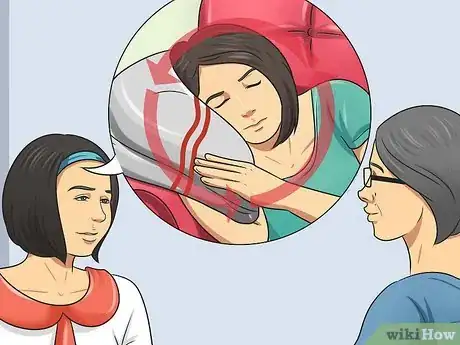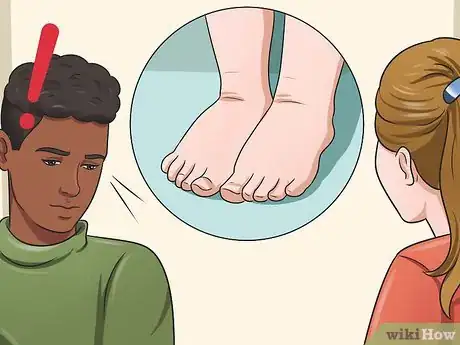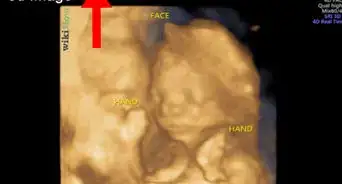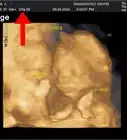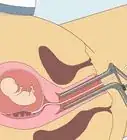This article was co-authored by Carrie Noriega, MD. Dr. Noriega is a Board Certified Obstetrician & Gynecologist and medical writer in Colorado. She specializes in women’s health, rheumatology, pulmonology, infectious disease, and gastroenterology. She received her MD from the Creighton School of Medicine in Omaha, Nebraska and completed her residency at the University of Missouri - Kansas City in 2005.
There are 7 references cited in this article, which can be found at the bottom of the page.
wikiHow marks an article as reader-approved once it receives enough positive feedback. This article has 37 testimonials from our readers, earning it our reader-approved status.
This article has been viewed 1,321,410 times.
It can be the most awkward thing in the world to ask someone if they are pregnant, especially if it turns out they are not. Maybe you are just curious and want to know, or maybe you’re trying to decide if you should give up your seat on the bus. Whatever the reason, there are some common indications of pregnancy that can help you determine if they are pregnant before asking so that you can prevent this awkward moment from happening. In general, however, it's best not to assume someone is pregnant. Avoid directly asking someone if they are pregnant and instead wait until they bring it up.
Steps
Determining if Someone is Pregnant Early On
-
1Look for a change in clothing. Early on in a pregnancy, many people begin wearing baggy clothes or clothing that looks like it could hide a "baby bump." As their belly grows, many people also need to buy maternity pants or clothing in a larger size. If you notice that they are wearing unusual clothing for their normal style or they are shopping for outfits in larger sizes, it could be because they are expecting.[1]
-
2Listen when they discusses their eating habits. Many pregnant people experience changes in appetite as well as changes in the types of foods they want to eat. Because of this, paying attention to their complaints or comments about food can help determine if they're pregnant:[2]
- Cravings: Not all pregnant people experience this, but some people find that they want to eat strange combinations of food (like pickles and ice cream) or that they only want to eat one type of food (like citrus foods or Chinese food). Pay attention when they talk about what they feel like eating!
- Food aversions: Many pregnant people experience the sudden onset of food issues with a particular type of food they never had a problem with before. If you know they love sushi and suddenly even the thought of fish turns their stomach, they might be pregnant.
- Hydration: Staying hydrated is essential to delivering vital nutrients to a fetus, so many pregnant people are careful to ensure they drink enough water. A pregnant person may show a sudden preoccupation with making sure they are hydrated and/or start carrying around a water bottle.
Advertisement -
3Look for signs of nausea. Along with changing eating habits, many pregnant people experience nausea called “morning sickness” in the early months of pregnancy. This could be the cause of some alterations in their diet, like if they're eating just crackers, but it can also happen unrelated to eating. Many people feel sick throughout the day and not just in the morning as the name suggests, so be sure to pay attention to any signs of nausea or vomiting. To help you distinguish this symptom from regular indigestion or the flu, morning sickness will be intense and last longer than the typical flu period of only a few days.[3]
-
4Pay attention to complaints about pain or discomfort. Pregnancy causes all sorts of changes, and this leads to soreness and aching throughout the body. If you hear them suddenly talking about lower back pain and headaches or dizziness, it could be associated with pregnancy.[4] When they comment on any pain or soreness, try following up by asking how they hurt themselves or if they are active in any sports and see what they say. For example:
- “Oh no! How long has your back been hurting?”
- “I heard you say earlier that you’ve been feeling lightheaded lately, have you been getting dizzy like that for a while?”
-
5Keep an eye on their behavior. In addition to physical changes, many pregnant people also exhibit changes in behavior or routine. Try observing the person you think may be pregnant and see if you notice any of the following behaviors:
- Using the bathroom more frequently than usual can indicate pregnancy. This is because changes in hormones and the pressure of the growing fetus on other organs can cause constipation, increased urination, and vomiting.[5]
- Mood swings are common in pregnant people because fluctuating levels of hormones can cause fatigue and spikes in a variety of emotions (like being really happy one moment and then crying uncontrollably for seemingly no reason).[6]
-
6Take note when they discuss their sleep patterns. Being exhausted is an extremely common complaint in pregnant people, especially in the first trimester. If you observe any of the following, it could be because they are pregnant:[7]
- They are noticeably too tired to keep up with everyday activities.
- They talk a lot about being exhausted or feeling “completely wiped out.”
- You find them napping often or at odd times (like when they are on the job or at school).
-
7Ask about their plans for the future. A subtle way of determining whether or not someone is pregnant is to ask them about any upcoming plans. Because a typical pregnancy lasts nine months, asking about plans that would fall around that time period can help you figure out if they are pregnant now. If they are pregnant, they will be too far along in the third trimester to travel, so try asking if they'd be interested in a trip in a couple of months. You could also ask them if they have any plans for the summer, and see if they let it slip that they will be decorating a nursery!
Recognizing Pregnancy Later On
-
1Look at the shape of their abdomen. A person's body changes a lot during pregnancy, particularly in their abdomen. As the baby grows, the abdomen needs to expand to accommodate. This can sometimes be difficult to differentiate from belly fat in the same area, but a pregnancy has some subtle distinguishing characteristics. Weight gain in the belly area that looks like a well-defined bump, but little to no weight gain in other areas of the body is most likely caused by pregnancy. If you happen to accidentally bump into them, keep in mind that a pregnant belly is also much firmer than belly fat.[8]
-
2Take note of their breasts. Enlarged, growing breasts are a common physical change because breast tissue is very sensitive to hormonal changes. If you don’t know this person, this might not be helpful since you don’t have a pre-pregnancy breast size to compare their current size to; however, some pregnant people in the later stages of pregnancy have disproportionately large breasts to the rest of their body because they swell with milk production.[9]
-
3Look at their feet and ankles. Swollen ankles are also very common in pregnant people, especially around the fifth month. This is because the body retains more water and produces more blood and body fluid when a person is pregnant.[10] They may also be wearing extra comfortable, supportive shoes or flip-flops to help with the pain associated with walking and standing with swollen feet and ankles.
-
4Notice how they are moving around. As their body begins to change and grow, many pregnant people also begin experiencing changes to their mobility. Keep an eye out for these common signs:
- A waddling walk and other changes in gait are common as the growing belly and swelling feet cause the person's balance to be thrown off a bit.
- Many pregnant people tend to hold their belly or keep a hand on their bump as they move around. This is both for balance and because of the bond that is growing between the mother and child.[11]
-
5Listen for any shortness of breath. In addition to changes in mobility, many pregnant people also experience shortness of breath in their second and third trimesters. This is caused by the growing fetus needing more and more oxygen and also by the expanding uterus putting more pressure on the lungs and diaphragm.[12] Feeling winded with minimal exertion is very common, and in combination with other signs of pregnancy can be conclusive.
Expert Q&A
Did you know you can get expert answers for this article?
Unlock expert answers by supporting wikiHow
-
QuestionWhat does 2 lines mean on a pregnancy test?
 Carrie Noriega, MDDr. Noriega is a Board Certified Obstetrician & Gynecologist and medical writer in Colorado. She specializes in women’s health, rheumatology, pulmonology, infectious disease, and gastroenterology. She received her MD from the Creighton School of Medicine in Omaha, Nebraska and completed her residency at the University of Missouri - Kansas City in 2005.
Carrie Noriega, MDDr. Noriega is a Board Certified Obstetrician & Gynecologist and medical writer in Colorado. She specializes in women’s health, rheumatology, pulmonology, infectious disease, and gastroenterology. She received her MD from the Creighton School of Medicine in Omaha, Nebraska and completed her residency at the University of Missouri - Kansas City in 2005.
Board Certified Obstetrician & Gynecologist
-
QuestionIs it possible to get pregnant even when I have used the morning after pills?
 Carrie Noriega, MDDr. Noriega is a Board Certified Obstetrician & Gynecologist and medical writer in Colorado. She specializes in women’s health, rheumatology, pulmonology, infectious disease, and gastroenterology. She received her MD from the Creighton School of Medicine in Omaha, Nebraska and completed her residency at the University of Missouri - Kansas City in 2005.
Carrie Noriega, MDDr. Noriega is a Board Certified Obstetrician & Gynecologist and medical writer in Colorado. She specializes in women’s health, rheumatology, pulmonology, infectious disease, and gastroenterology. She received her MD from the Creighton School of Medicine in Omaha, Nebraska and completed her residency at the University of Missouri - Kansas City in 2005.
Board Certified Obstetrician & Gynecologist Yes, there is still a chance you can get pregnant after using the morning after pill. If you use it within the first 24 hours of having unprotected sex it is 95% effective. The effectiveness decreases to 89% if you use it within the first 72 hours and after this is goes down substantially. If you think you might be pregnant, even after using the morning after pill, take a pregnancy test.
Yes, there is still a chance you can get pregnant after using the morning after pill. If you use it within the first 24 hours of having unprotected sex it is 95% effective. The effectiveness decreases to 89% if you use it within the first 72 hours and after this is goes down substantially. If you think you might be pregnant, even after using the morning after pill, take a pregnancy test.
References
- ↑ http://www.parents.com/pregnancy/signs/symptoms/signs-you-may-be-pregnant/
- ↑ http://www.parenting.com/gallery/early-signs-of-pregnancy
- ↑ http://www.healthywomen.org/content/article/tips-your-first-trimester?page=3
- ↑ http://www.babycenter.com/pregnancy-symptoms
- ↑ http://www.babycenter.com/pregnancy-symptoms
- ↑ http://www.parenting.com/gallery/early-signs-of-pregnancy
- ↑ http://americanpregnancy.org/your-pregnancy/fatigue-during-pregnancy/
- ↑ http://www.ncbi.nlm.nih.gov/pubmedhealth/PMH0072759/
- ↑ http://www.parents.com/pregnancy/signs/symptoms/signs-you-may-be-pregnant/
About This Article
If you’re trying to tell if someone is pregnant, pay attention to whether she has started to wear loose-fitting clothes or whether she has changed her eating habits. You may also notice that she shows signs of nausea, unusual aches and pains, or she is acting more tired than usual. If it is later in the pregnancy, you may be able to see a roundness in her abdomen, her breasts might seem larger than normal, and her feet and ankles may seem swollen. However, all of these could be signs of weight gain or other medical conditions, so it's best not to assume. If you want to learn how to ask questions without assuming pregnancy, keep reading!





